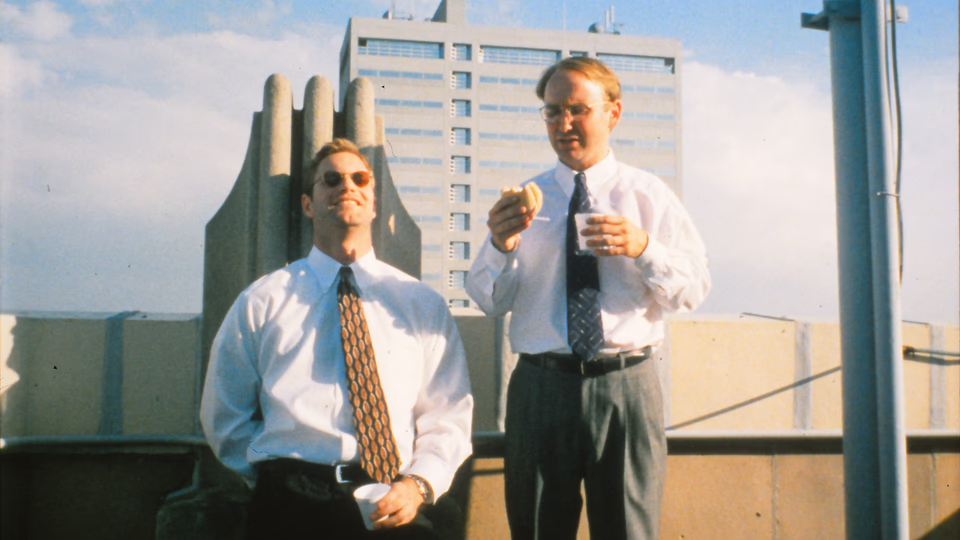In the Company of Men

Neil LaBute’s feature debut. A biting, subversive satire following executives Chad and Howard over a six-week business trip. Both abandoned by their significant others in the recent past, they hatch a plan to date and dump a deaf woman named Christine as a surrogate revenge.
Chad, played by Aaron Eckhart, is taller, with an amiable smile, firm jaw, and laconic manner. An early scene has him leafing through the company newsletter. He points at one name saying, “I hate this guy,” then another, “I hate that guy too”, then another, “He’s a little bastard.” The absurdity mounts as he keeps going, working, we sense, through the entire directory.
This brash satire continues in a scene where Chad dresses down a black intern named Keith.
Chad: “Offering you a chance. Keith, right?”
Keith: “Yeah. Keif.”
Chad: “Keith or Keif?”
Keith: “Keif.”
Chad: “Which?”
Keith: “Keith.”
Chad: “Well, you ought to know.”
LaBute pushes the scene further with Chad explaining how, to succeed at the company, it takes balls. Does Keith have them? Chad wants to see. “Show. Me. Your. Balls,” he says. Keith wilts under the pressure and drops his pants, submitting to Chad’s impassive gaze. I can’t recall a scene that better mixes absurd comedy and traumatic horror with no graphic imagery.
Chad could be the middle brother between Brett Easton Ellis’s Sean and Patrick Bateman. He conceives the plan to date and dump Christine by saying, “Let’s hurt someone,” with a smile of anticipation.
Howard, played by Matt Malloy, is smaller, with a slight paunch, receding hairline, and nervous manner. He proves reluctant at first, but soon agrees to Chad’s plan. If Chad is the stereotypical alpha male, then Howard is the entitled troll. He apes alpha behavior, taking a hard line with a caller when coworkers are within earshot, but softens once his office door closes and we discover he’s talking to his mother. He avoids conflict and stews in private, reeking of neediness and looking for answers from everyone but himself.
Their mark, Christine, played by Stacy Edwards, works as an assistant in the office. She lost her hearing at age eight and keeps to herself. Upon realizing she’s deaf, Chad approaches her from behind. He snaps his fingers. No response. Then he yells. When she still doesn’t react, he lets loose a gleeful giggle and runs back to tell Howard. In his eyes, her deafness is weakness made manifest. The perfect victim.
Title cards introduce each week. Chad and Howard romance Christine. She falls for Chad, but Howard falls for her. This could setup a romantic drama or rom-com, but LaBute eschews comfortable tropes. He’s out to reflect an unflattering reality.
Howard learns sign-language and takes Christine to the nicest restaurants in town. Chad takes her to a barbeque restaurant where you order off the place mats. When she tells Howard she’s fallen for the better looking Chad, it violates Howard’s sense of entitlement and reinforces his insecurities. In a fit of blubbering rage, Howard grabs her, yelling, “Look at you! You are fucking handicapped! You think you can choose?”
The scene where Chad ends things with Christine proves just as biting. She knows about the plan and Chad starts to spin it as a competition between him and Howard to win her heart, but bursts into a fit of sharp laughter. Eckhart’s performance here—that laugh in particular—astounds. It sounds so authentic, yet so removed from any laugh we’ve heard from him up to that point, as if we’re hearing his real laugh. I’ve seen the movie at least three times now and it still chills. Just as the line that follows makes me guffaw—if only to break the tension—when he says, “I was gonna let you down easy, but I can’t keep a straight face.”
One could read this as victim blaming. LaBute punishing Christine for leading Howard on and picking the wrong guy. But this view is shortsighted. LaBute is victim blaming, but Christine isn’t the victim. We are.
We, the world that condones and even encourages Chad and others like him. The backing score—best described as dissonant tribal jazz, the indistinct cut-throat company employing the men, and the abundance of “Caution” tape strewn around the office, all convey a dangerous, jungle-like world full of predators fighting to climb the food chain. We value the Chads of the world because they get things done. They close the deal. Deliver results. Outperform the other guy. So we turn a blind-eye to how they go about it. As Chad says when asked why he did it, “Because I could.”